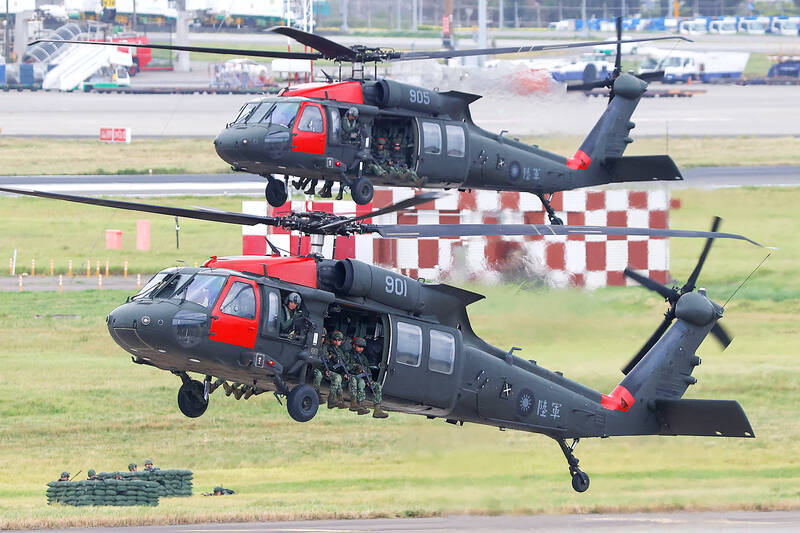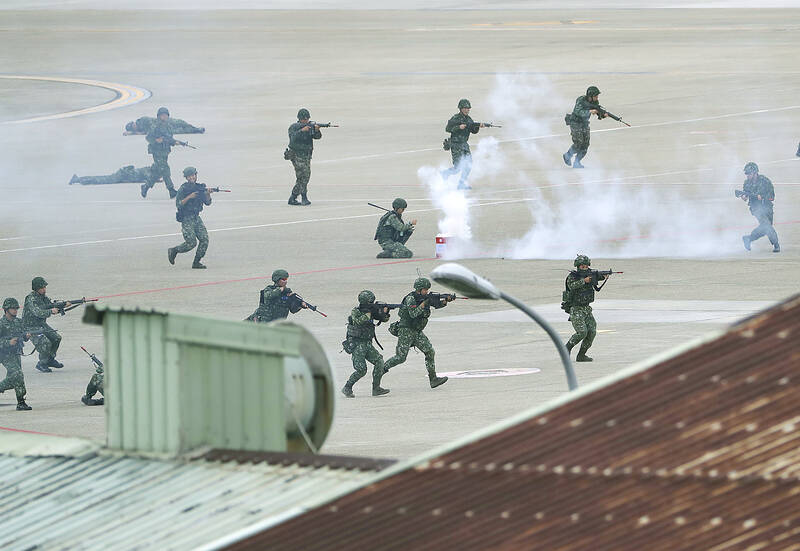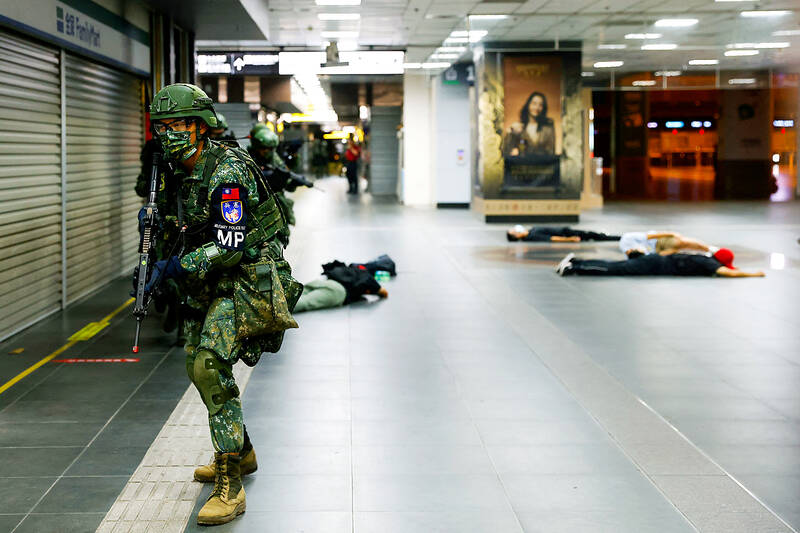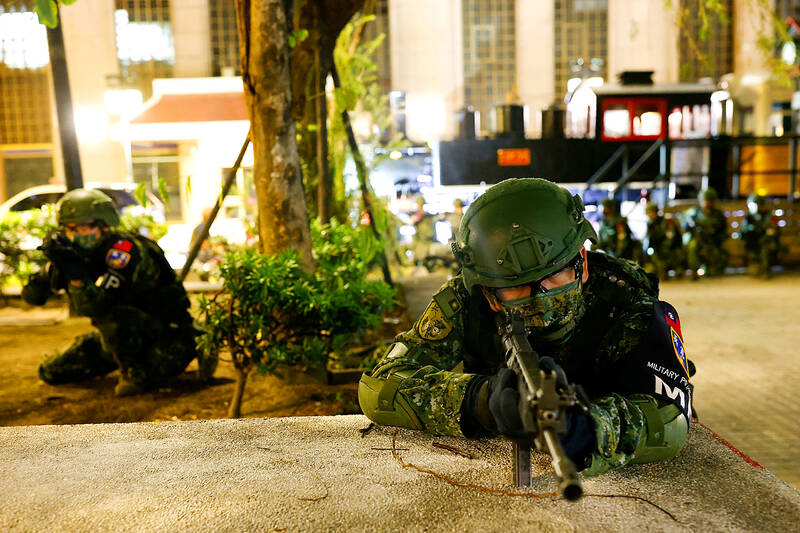The military yesterday conducted its first anti-takeover drill at Taiwan’s major international gateway in Taoyuan to test its ability to fend off a Chinese invasion, as the nation’s annual live-fire Han Kuang exercises continued.
At Taiwan Taoyuan International Airport, members of the Aviation Special Forces Command and Army Airborne Special Forces posed as “red” invading forces and “blue” ground troops deployed to repel the takeover, the Ministry of National Defense said.
The exercise was designed to test the armed forces’ cross-branch coordination and emergency response capabilities during a simulated Chinese invasion, the ministry said.

Photo: Ann Wang, Reuters
During the 40-minute drill, the red team arrived at the airport in four UH-60 Black Hawk helicopters and engaged in a simulated attack, while the blue team — consisting of army soldiers, aviation police officers and airport firefighters — defended the airport.
The red team also simulated a bomb attack at the airport, and firefighters on the blue team used two Oshkosh Striker 3000 firefighting vehicles to extinguish the explosives, the ministry said.
Similar drills had previously been staged at airports in Taiwan, but never at the nation’s busiest civilian airport in Taoyuan.

Photo: AP
When the ministry first announced the exercise earlier this year, Minister of Transportation and Communications Wang Kwo-tsai (王國材) said it would last an hour and potentially affect at least 61 flights and more than 4,000 travelers.
Yesterday, the drill was cut to 40 minutes, with the defense ministry saying it was done so that no scheduled flight would be delayed or affected by the exercise.
Taiwan Taoyuan International Airport live flight data showed that no commercial planes left a gate between 9:19am and 9:55am, and only one landed between 9:09am and 10:14am, indicating that the airport was not handling commercial traffic for about 40 minutes.

Photo: Reuters
The military was also scheduled to hold an emergency landing and takeoff drill at a civilian airport in southeastern Taiwan on Tuesday as part of the Han Kuang exercises, but it was canceled on Monday due to Typhoon Doksuri, which was expected to affect the south.
The planned drill at Taitung Fengnian Airport, the first of its kind since the airport opened in 1981, would have involved F-16 jets and C-130H Hercules transport aircraft, the defense ministry said.
The live-fire component of this year’s Han Kuang exercises started early on Monday.

Photo: Reuters
The annual military drills, which have served as Taiwan’s major war games since 1984, consist of live-fire exercises and computerized war games, and are meant to test the military’s combat readiness in the face of a possible Chinese invasion.
This year’s tabletop exercises were staged in May.
Meanwhile, the military and civilian police joined forces early Wednesday for a hostage crisis and bomb threat drill for the first times at the Taipei Main Station, as part of the ongoing live-fire part of the Han Kuang military exercises.
The drill, held on Wednesday morning around 2 a.m. in one section of Taipei Main Station, one of Taiwan’s busiest transportation hubs, involved a mock hostage taking of civilians by hostile forces.
After being informed about the situation by metro police, military police from the nearby 211th battalion under the 202nd Military Police Command, along with officers from the Taipei Police Department, arrived at the scene.
After eliminating the abductors, the police then discovered a mock explosive device and dispatched a bomb squad to detonate it.
In addition, before the Taipei Main drill, the 202nd Military Police Command held a round of exercises involving the blockading of a bridge around midnight, which simulated the prevention of enemy forces advancing into Taipei City from nearby New Taipei City.
Working together with Taipei Wanhua District police forces and civilian defense units, military police used roadblocks to set up spot-check sites at Wanban Bridge —that connects New Taipei’s Banqiao District with Taipei’s Wanhua District — to stop enemy forces traveling into Wanhua, which is only ten minutes away from the Presidential Office Building and Taipei Main Station, as well as other key political and economic infrastructure.

CHAOS: Iranians took to the streets playing celebratory music after reports of Khamenei’s death on Saturday, while mourners also gathered in Tehran yesterday Iranian Supreme Leader Ayatollah Ali Khamenei was killed in a major attack on Iran launched by Israel and the US, throwing the future of the Islamic republic into doubt and raising the risk of regional instability. Iranian state television and the state-run IRNA news agency announced the 86-year-old’s death early yesterday. US President Donald Trump said it gave Iranians their “greatest chance” to “take back” their country. The announcements came after a joint US and Israeli aerial bombardment that targeted Iranian military and governmental sites. Trump said the “heavy and pinpoint bombing” would continue through the week or as long

TRUST: The KMT said it respected the US’ timing and considerations, and hoped it would continue to honor its commitments to helping Taiwan bolster its defenses and deterrence US President Donald Trump is delaying a multibillion-dollar arms sale to Taiwan to ensure his visit to Beijing is successful, a New York Times report said. The weapons sales package has stalled in the US Department of State, the report said, citing US officials it did not identify. The White House has told agencies not to push forward ahead of Trump’s meeting with Chinese President Xi Jinping (習近平), it said. The two last month held a phone call to discuss trade and geopolitical flashpoints ahead of the summit. Xi raised the Taiwan issue and urged the US to handle arms sales to

BIG SPENDERS: Foreign investors bought the most Taiwan equities since 2005, signaling confidence that an AI boom would continue to benefit chipmakers Taiwan Semiconductor Manufacturing Co’s (TSMC, 台積電) market capitalization swelled to US$2 trillion for the first time following a 4.25 percent rally in its American depositary receipts (ADR) overnight, putting the world’s biggest contract chipmaker sixth on the list of the world’s biggest companies by market capitalization, just behind Amazon.com Inc. The site CompaniesMarketcap.com ranked TSMC ahead of Saudi Aramco and Meta Platforms Inc. The Taiwanese company’s ADRs on Tuesday surged to US$385.75 on the New York Stock Exchange, as strong demand for artificial intelligence (AI) applications led to chip supply constraints and boost revenue growth to record-breaking levels. Each TSMC ADR represents

State-run CPC Corp, Taiwan (CPC, 台灣中油) yesterday said that it had confirmed on Saturday night with its liquefied natural gas (LNG) and crude oil suppliers that shipments are proceeding as scheduled and that domestic supplies remain unaffected. The CPC yesterday announced the gasoline and diesel prices will rise by NT$0.2 and NT$0.4 per liter, respectively, starting Monday, citing Middle East tensions and blizzards in the eastern United States. CPC also iterated it has been reducing the proportion of crude oil imports from the Middle East and diversifying its supply sources in the past few years in response to geopolitical risks, expanding